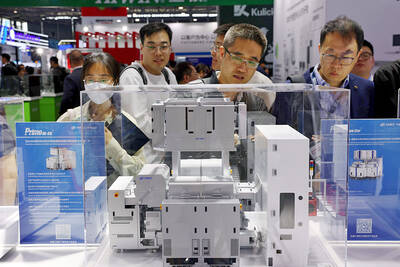Nestle SA is preparing for post-COVID-19 pandemic coffee growth as the world’s largest food company rolls out touchless machines for the office and bets new flavors would win over more consumers making coffee at home.
The maker of Nespresso and Nescafe is planning a wider introduction of machines that can be controlled via smartphone, catering to concern about viral transmission, head of coffee brands David Rennie said in an interview.
Coffee was one of the motors of Nestle’s sales growth last year and makes up the bulk of the company’s US$24 billion beverage business.
Following a lukewarm introduction of Nespresso in the late 2000s, Nestle has made some bolder steps to boost its US coffee business in the past few years. The company splurged US$7.15 billion on a partnership with Starbucks Corp in 2018, and now makes the coffee chain’s products for at-home use worldwide.
That was a boon during the pandemic, when consumers were more likely to use Starbucks capsules in a Nespresso machine than take a walk to a cafe.
As vaccination drives bring the prospect of post-pandemic life in view, Nestle is eyeing opportunities to expand in offices while trying to keep stoking at-home demand with new capsules and types of soluble coffee.
“As people return to offices, they may not be going back in the same numbers as pre-COVID,” Rennie said by telephone. “In-home consumption will continue to grow.”
Rennie said he sees big growth prospects in China, where average consumption of coffee is at just seven cups per person a year. Nestle opened almost 900 Starbucks counter locations in China last year as the country recovered from lockdowns faster than other countries.
India and Africa are also priority markets for expansion, Rennie said.
Contactless coffee machines are being rolled out globally, with introductions in Russia and China in coming weeks.
The US overtook France as Nespresso’s biggest market last year, and Rennie said there is still room for growth there as capsules and soluble coffee become increasingly in vogue.
Cold and flavored coffee would be a focus there this year, with iced tropical coconut coffee and other flavors being introduced.
“The good thing about the US market is that it’s very big,” said Rennie, who was promoted to Nestle’s executive board this month in a sign of coffee’s importance at the Vevey, Switzerland-based food company. “We’re still a relative newcomer there.”
While Nespresso boutiques would remain a key part of the brand’s strategy, the increased importance of e-commerce means the company would look at optimizing its store network, which counts 816 boutiques in 76 countries, Rennie said.
The company sees the global coffee market growing 4 to 5 percent by value in the next few years as people gradually return to office and to their old coffee drinking habits, Rennie said.
That means green coffee needs could expand 2 percent by volume.
Nestle’s coffee sales rose 5 percent last year, adjusted for acquisitions and currency shifts.
There is steady growth in coffee, although the out-of-home segment could take two to three years to return to pre-pandemic levels, Rennie said.
For the global coffee market, “the challenge is making sure that demand and supply are kept in balance and we expect they will be balanced.”

SEMICONDUCTOR SERVICES: A company executive said that Taiwanese firms must think about how to participate in global supply chains and lift their competitiveness Taiwan Semiconductor Manufacturing Co (TSMC, 台積電) yesterday said it expects to launch its first multifunctional service center in Pingtung County in the middle of 2027, in a bid to foster a resilient high-tech facility construction ecosystem. TSMC broached the idea of creating a center two or three years ago when it started building new manufacturing capacity in the US and Japan, the company said. The center, dubbed an “ecosystem park,” would assist local manufacturing facility construction partners to upgrade their capabilities and secure more deals from other global chipmakers such as Intel Corp, Micron Technology Inc and Infineon Technologies AG, TSMC said. It

EXPORT GROWTH: The AI boom has shortened chip cycles to just one year, putting pressure on chipmakers to accelerate development and expand packaging capacity Developing a localized supply chain for advanced packaging equipment is critical for keeping pace with customers’ increasingly shrinking time-to-market cycles for new artificial intelligence (AI) chips, Taiwan Semiconductor Manufacturing Co (TSMC, 台積電) said yesterday. Spurred on by the AI revolution, customers are accelerating product upgrades to nearly every year, compared with the two to three-year development cadence in the past, TSMC vice president of advanced packaging technology and service Jun He (何軍) said at a 3D IC Global Summit organized by SEMI in Taipei. These shortened cycles put heavy pressure on chipmakers, as the entire process — from chip design to mass

Germany is to establish its first-ever national pavilion at Semicon Taiwan, which starts tomorrow in Taipei, as the country looks to raise its profile and deepen semiconductor ties with Taiwan as global chip demand accelerates. Martin Mayer, a semiconductor investment expert at Germany Trade & Invest (GTAI), Germany’s international economic promotion agency, said before leaving for Taiwan that the nation is a crucial partner in developing Germany’s semiconductor ecosystem. Germany’s debut at the international semiconductor exhibition in Taipei aims to “show presence” and signal its commitment to semiconductors, while building trust with Taiwanese companies, government and industry associations, he said. “The best outcome

Semiconductor equipment billings in Taiwan are expected to double this year, as manufacturers in the industry are keen to expand production to meet strong global demand for artificial intelligence applications, according to SEMI, which represents companies in the electronics manufacturing and design supply chain. Speaking at a news conference before the opening of Semicon Taiwan trade show tomorrow, SEMI director of industry research and statistics Clark Tseng (曾瑞榆) said semiconductor equipment billings in Taiwan are expected to grow by an annual 100 percent this year, beating an earlier estimate of 70 percent growth. He said that Taiwan received a boost from a